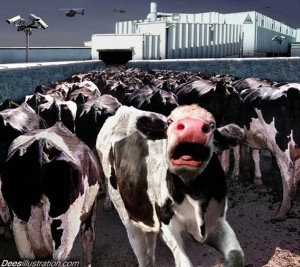 What would happen if Americans got rid of government meat inspection? Would American consumers be then poisoned by tainted, rancid, rotten or adulterated meat on supermarket shelves? An episode from 2004 answers this question.
What would happen if Americans got rid of government meat inspection? Would American consumers be then poisoned by tainted, rancid, rotten or adulterated meat on supermarket shelves? An episode from 2004 answers this question.
Since the early 1900s, federal law has required that all meatpacking companies that ship meat interstate be inspected by federal inspectors. This bureaucracy costs American taxpayers in excess of a billion dollars annually. Many critics have pointed out that the government’s “inspections” amount to little more than what consumers do on their own when they shop for meat. USDA inspectors simply sniff, poke and look at meat as it is being processed.
In 2003, the government of Japan announced that it would require all beef sold in Japan to be tested for “mad cow disease,” also known as bovine spongiform encephalopathy or BSE. This of course goes beyond what American beef inspection requires. The official U.S. position on mad cow disease is that concern about the disease is mostly due to hysteria; this position was forged by heavy lobbying by the major U.S. beef processors, along with cattlemens organizations. (Note that I don’t necessarily disagree with this position.)
But if the Japanese wanted their beef to be certified as BSE-free, the rules of capitalism dictate that American beef providers should—in a free market—want to provide such certification. In 2004, a meatpacking plant in Arkansas City, Kansas sought to provide such BSE testing and certification. But the plant—operated by a small firm named Creekstone Farms—was stopped by the USDA. The USDA announced that Creekstone Farms was prohibited from doing any additional testing! The USDA’s actions caused the Kansas meat plant to lay off 150 of its 800 workers in 2005 and to place the rest on part-time status. (About 40 percent of Creekstone’s sales were to Japan.)
Why did the USDA prevent Creekstone Farms from testing its meat for mad cow disease? Probably because of back-room lobbying by the largest American meatpackers (Tyson, Smithfield, Swift, etc.), who viewed Creekstone’s BSE-certification efforts as a source of dangerous competition. The U.S. government denied this, claiming that Creekstone’s BSE-testing system (like Japan’s) wasn’t sufficient to detect mad cow disease with certainty in all animals younger than 30 months. Thus, according to the U.S. government, Creekstone’s additional testing would have given consumers a false sense of security.
Creekstone Farms acknowledged the imperfections of BSE testing. But the issue wasn’t how good the company’s (or any company’s) testing procedures were. The real issue was whether the federal government can deny an American business its right to do the best it can to satisfy its customers.
We must never forget the lesson of the Creekstone Farms episode. Although a decade has passed since this outrage, the episode proves that food safety is not guaranteed by government inspectors. True food safety stems from free-market competition between food providers. And government regulation is often a guise behind which consumers are made to accept goods and services of lower quality.

